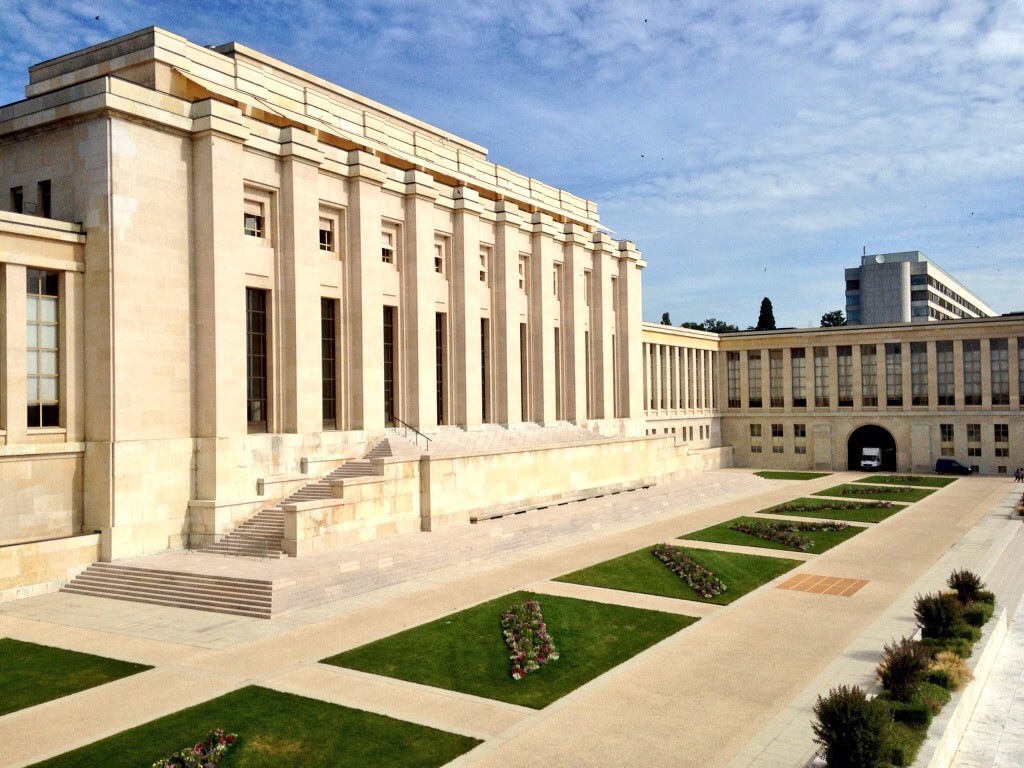To download a PDF of the summary click here or please continue reading for the full summary.
In June 2015, Americans for Democracy & Human Rights in Bahrain (ADHRB) engaged the 29th Session of the United Nations Human Rights Council (HRC) in Geneva to raise awareness of ongoing human rights abuses in Bahrain, Saudi Arabia, and other Gulf Cooperation Council (GCC) States. ADHRB met with dozens of UN Member States, the United Nations Office of the High Commissioner for Human Rights (OHCHR), NGOs, United Nations (UN) officials and Special Procedures. Additionally, ADHRB hosted two side events, conducted oral interventions, and provided commentary on the proceedings of the Session.
In the first week of the session, ADHRB’s Executive Director Husain Abdulla delivered an oral intervention under
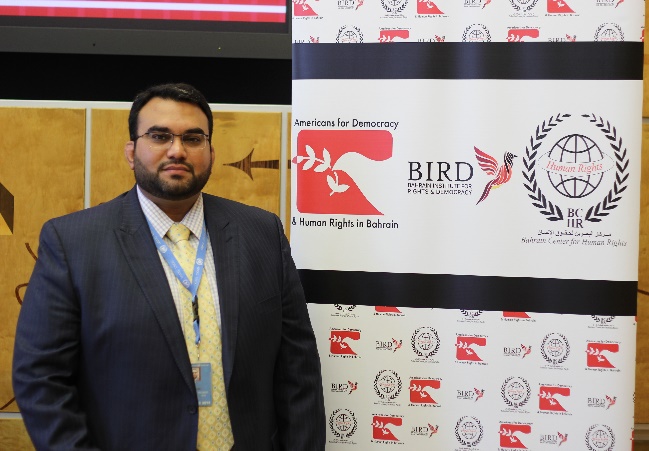
Agenda Item 2. Mr. Abdulla called the High Commissioner’s attention to the continued exploitation of migrant workers in Qatar and other GCC states. This is especially important because Qatar’s new World Cup stadiums are built with the labor of these abused workers.
Later in the week on 18 June, ADHRB’s International Advocacy Officer Michael Payne participated in an Interactive Dialogue with the Special Rapporteur on the Independence of Judges and Lawyers. He praised the Special Rapporteur for her visit to the United Arab Emirates and her recommendations on increasing the independence of their judiciary system. In his intervention, Mr. Payne condemned local elites in the UAE for interfering in the administration of justice. He recommended increased independence of the justice system. On that same day Ms. Nedal al-Salman of the Bahrain Centre for Human Rights delivered an oral intervention on behalf of ADHRB, Alsalam Foundation, and the Bahrain Institute for Rights and Democracy. She drew the Council’s attention to the prominent practice of using arbitrary detention against children in Bahrain.
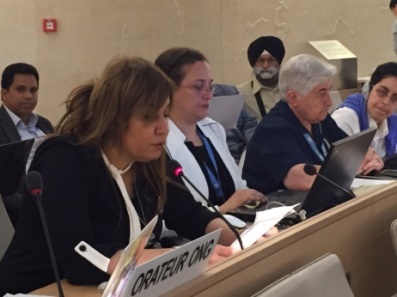
The following week, Ms. Nedal Al-Salman participated in an interactive dialogue on arbitrary and extrajudicial executions in Bahrain. She delivered the oral intervention on behalf of ADHRB, BCHR, and BIRD. She urged the Council to consider arbitrary executions an “immediate” concern. She reminded all in attendance of Zakariyah al-Asheeri, a human rights blogger in Bahrain who was arrested. Upon his arrest, he was beaten to death while in custody. All policemen that participated were acquitted by the government.
Later in the week Sayed Ahmed Alwadaei, Director of Advocacy at BIRD on behalf of BIRD, BCHR, and ADHRB participated in an Interactive Dialogue on arbitrary detention and torture. He called on the Council to recognize the Government of Bahrain’s terror tactics which include arbitrary detention of dissidents, enforced disappearances, use of excessive force against civilians, and torture in response to those that participate in peaceful protests with the intention of achieving valid government reforms. He said that these practices are now, “systematic and unrelenting.”
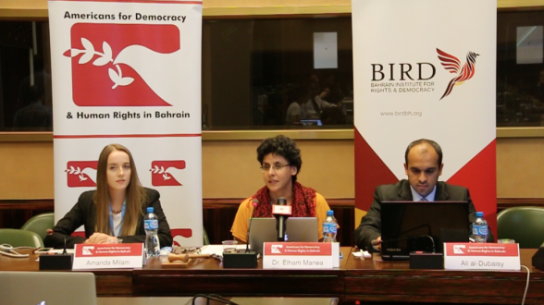
Yemeni activist Ahmed Ebrahim also delivered an oral intervention under Item 4 addressing Saudi Arabia’s violation of international humanitarian law in Yemen.
On 25 June 2015 ADHRB, along with BIRD, Amnesty International, Human Rights Watch, and the European Saudi Organization for Human Rights, co-sponsored a side-event entitled, “Women’s Rights in Saudi Arabia.” Panelists included Amanda Milani, UN Liaison for ADHRB, Ali al-Dubaisy, Head of the ESOHR, and Hala al-Dosary, a Saudi writer and activists, and was moderated by Dr. Elham Manae. The panel focused on how Saudi Arabia keeps women in a perpetual state of subservience to males. It also tackled how entrenching religion, such as Sharia Law, into the legal system hinders women from obtaining full equality. The discussion was centered on how these factors contribute to violence against women, and how females are unable to pursue justice.
That same day, ADHRB Executive Director Husain Abdulla delivered a statement to the Council on suppression of free speech in Qatar. He condemned the criminal sanctions placed on individuals for voicing their opinions, even if it contradicts the government. Mr. Abdulla told the Council of Mr. Mohammed al-Ajami, a literature student and poet in Qatar. He recited a poem that was critical of the government, which led to his arrest and a 15 year prison sentence. In addition to Mr. Abdulla’s statement, Yemeni activists Haider Abdulla delivered an oral intervention under Item 2 & 3. It called the Council’s attention to Saudi Arabia’s indiscriminate use of airstrikes in Yemen. Nedal al-Salman of BCHR, in partnership with ADHRB and BIRD, delivered a statement during the Item 5 General Debate on continued silencing of political dissent in Bahrain.
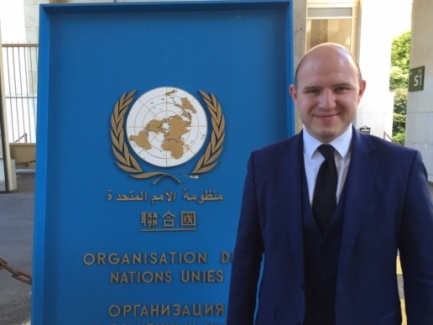
On 26 June 2015 ADHRB co-sponsored a second side-event, “Bahrain Political Prisoners and Human Rights Defenders.” The event was hosted with the support of BIRD, BCHR, the International Federation for Human Rights (FIDH), World Organization Against Torture (OMCT), Amnesty International, the Gulf Center for Human Rights (GCHR), and Human Rights Watch. Its focus was the alarming number of political prisoners in Bahrain. These prisoners reside in the notorious Jau Prison, renowned for its inhumane and degrading treatment of prisoners. This event additionally served to launch ADHRB’s newest report “Inside Jau: Government Brutality in Bahrain’s Central Prison.”
That same day, Nawaf al-Hendal addressed the Council. He delivered a statement under Item 6 alerting the Council to intense restrictions on freedom of expression in Kuwait. He cited cases where individuals are accused of criticizing the Kuwaiti Emir and condemned harsh prison sentences handed down by the government. Saudi activist Ali al-Dubaisy also addressed the Council. He decried the lack of follow-up on Universal Period Review recommendations for GCC states. He urged the Council to recognize that few reforms have actually been initiated in the GCC. He also delivered a second intervention under Item 5 that spotlighted the prevalence of violence against women in Saudi Arabia.
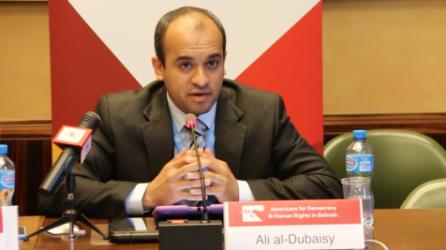
In the last week of the session, Amanda Milani delivered an Item 6 intervention on the UPR of Oman. She spoke of ADHRB’s concerns over Oman’s continued restrictions on freedom of assembly. She urged Oman to abide by the ICCPR and to lift restrictions on public political participation. ADHRB’s Michael Payne delivered an Item 8 intervention on the criminalization of free expression in Bahrain and Saudi Arabia. He condemned the use of anti-terror laws to target peaceful political activists. Amanda Milani addressed the Council again during an Item 8 intervention. She asked for the Council to take, urgent and effective measures,” to stop torture in inhumane treatment occurring in Bahrain’s infamous Jau Prison. The government continues to allow periodic beatings of
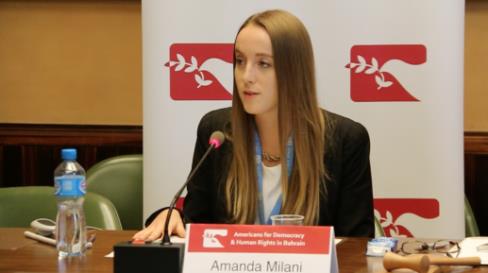
prisoners by guards, religious hate speech targeting Shia inmates, and denying prisoners access to food, sanitation, and medical care. In an Item 9 intervention. Michael Payne exposed Saudi Arabia’s destruction of religious and cultural sites, which violates the Durban Declaration. Ms. Milani also delivered an item 9 intervention on discrimination against minority ethnic groups in Bahrain. Mr. Payne delivered two final interventions, another on the use of anti-terror legislation to criminalize free speech in Bahrain and Saudi Arabia, and one on cooperation between the Kingdom of Saudi Arabia and the Office of the High Commissioner on Human Rights.


